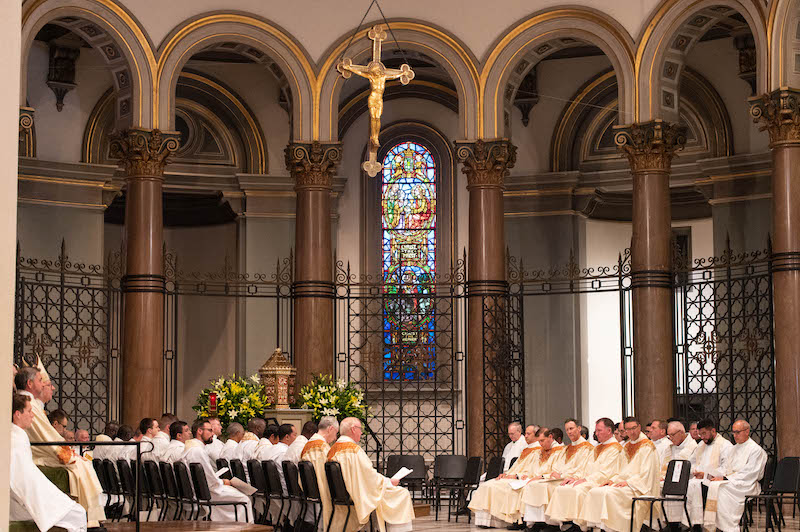Question: Why doesn’t the church allow women to be priests? (Location withheld)
Answer: The reason why women can’t be ordained priests is because of the pattern set by Jesus himself while he walked the earth.
Pope St. John Paul II mentions this historical fact as the fundamental rationale for reserving the sacrament of holy orders to men in his 1994 apostolic letter “Ordinatio Sacerdotalis.”
The original 12 apostles were the first bishops; the priesthood is deeply connected to and flows out from the office of bishops. All bishops start as priests, and only a bishop can ordain new priests.
We know from Scripture that Jesus called only men to be apostles. As several saints and scholars have noted over the centuries, Jesus didn’t even call Our Lady to be an apostle, even though after Jesus she was the holiest person ever to be born.
Of course, some people say that Jesus was only following the customs of his time in calling only men to ordained ministry. But Jesus was truly God, so if he wanted to call women to the priesthood, he certainly would have had the power to do that.
We also have many instances in the Gospels where Jesus did treat women as equals, even when the culture of his time would not have seen women this way.
For example, in chapter 10 of Luke’s Gospel, Jesus encourages Mary (sister of Sts. Martha and Lazarus) to sit at his feet as a student, at a time when ordinarily formal studies were considered something proper to men. And St. Mary Magdalene was the first witness of the Resurrection – even while women under Jewish law at the time could not be witnesses in formal court cases.
Some argue that it’s not fair for men to be able to be priests when women can’t. But priesthood – and really, any position in the Church – is not about power or prestige, but about service to others. Priests are priests so that they can serve the rest of the Church, not so that the Church can serve them. Even though Jesus’ actions are the reason why we can’t have women priests, professional theologians sometimes make educated guesses on why Jesus may have made that choice. There are a lot of really interesting writings out there on the idea that men and women have different but equal and complementary vocations in the church, even if these writings aren’t official Church teachings at this point.
Question: Our priest has recently stopped using the processional cross, and now we have no crucifix on the altar during Mass or at any other time. I’ve always thought that there is supposed to be a crucifix on the altar to remind us all of the suffering and passion of Christ. (Location withheld)
Answer: Yes, the General Instruction of the Roman Missal, the “instruction book” for how Mass is to be celebrated, specifically indicates that “on the altar or close to it, there is to be a cross adorned with a figure of Christ crucified” (GIRM, No. 117).
Presumably, this is not only to remind us of Christ’s passion, but also to help call to mind how the holy sacrifice of the Mass is the same thing as Christ’s original sacrifice of his life on Calvary.
If it looks as though your parish is not following this norm, the best thing to do would be to share your concerns directly with your pastor in a respectful way.
Question: We recently sold our house thanks to St. Joseph’s intercession. We buried a statue in the front yard and un – earthed it once the house was sold. While moving, the head of the statue broke off. Is it ok to simply glue it back on? (Location withheld)
Answer: Yes, it’s fine just to glue it back on!
Generally, we say that devotional objects, especially blessed devotional objects, should be treated with a certain degree of respect (e.g., worn or damaged devotional objects should be disposed of reverently and not simply thrown out with the regular trash).
Carefully repairing a St. Joseph statue is very much in line with this kind of reverence. But devotional objects such as statues and images of saints aren’t magical or holy in and of themselves.
In a similar way to how family photos can help us recall our loved ones, images of saints remind us of who we are, as the family of the people of God.
Jenna Marie Cooper, who holds a licentiate in canon law, is a consecrated virgin and a canonist whose column appears weekly at OSV News. Send your questions to [email protected].

